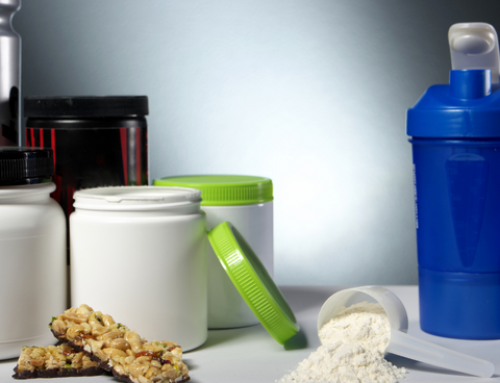NSF Q&A: How to Select Safe Nutritional Supplements
Athletes will go to great lengths to improve their performance. That’s why nutrition supplements have become so popular with athletes. If a supplement can help give you even the slightest edge, why wouldn’t you take it?
Although nutrition supplements can boost your results from training sessions, some are dangerous and can negatively affect your health—or even disqualify you from competition. In the interview below, Edward Wyszumiala, general manger of NSF International’s Dietary Supplement Certified for Sport program, explains how to make smart supplement decisions.
Editor’s Note: Founded in 1944, NSF International is an independent global health and safety organization that writes public health standards for food, water and consumer goods, and that tests and certifies dietary supplements and nutritional products.
STACK: Could you explain the dangers of untested nutrition supplements?
Ed Wyszumiala: Without testing and certification, you don’t know that what’s on the label is actually present in the product. NSF International’s Dietary Supplement Certification program certifies that what is on the label is in the bottle and that the product does not contain undeclared ingredients or contaminants.
To earn NSF Dietary Supplement Certification, products must undergo rigorous testing and inspection to verify compliance with NSF/ANSI Standard 173, the only official accredited American National Standard for dietary supplements and ingredients. The standard requires label claim testing/verification, a contaminant review and a facility audit.
NSF’s Certified for Sport program builds on the Dietary Supplement Certification program by including screening that ensures the product does not contain banned or prohibited substances. NSF scientists also test products for more than 165 athletic banned substances and undeclared ingredients, including stimulants, narcotics, steroids, diuretics, masking agents or other unsafe levels of contaminants. Ongoing product monitoring and testing is conducted to verify ongoing compliance.
STACK: What contaminants are found in some nutrition supplements, and how do they affect your health?
EW: Another reason NSF certification is essential is because testing can determine whether there are unsafe levels of contaminants in the product, such as heavy metals, pesticides and herbicides that may adversely affect your health. NSF certification also helps make sure there are no unlisted ingredients, which is useful for those with allergies, as well as for athletes.
STACK: How should a student-athlete choose a nutrition supplement?
EW: First, consult with a physician. It’s important for people of all ages, but it is especially important for high school students whose bodies are still maturing. Share with your doctor why you want to take a supplement and disclose any products or medications you are already taking. Then discuss your options. Some additional things to look for when purchasing and taking a sports supplement include:
- Read the label carefully. Question outrageous claims. As with virtually any type of product, if it seems too good to be true, it probably is. If you’re taking a product and notice any unusual side effects, such as increased acne, baldness or deepening of the voice, there might be some level of steroids in the product.
- Fast results. Building up muscle and improving endurance take time. If you notice an almost immediate change in either of those things, there is a good chance that the supplement contains a banned substance or steroid.
- Label warnings. Adverse effect warnings are fairly commonplace on over-the-counter products. But if the warning label for a sports supplement lists serious adverse effects—especially for those who are pregnant, have heart disease or are over a certain age—think twice before purchasing.
- Certification. Look for certification from an independent third party. Programs such as NSF International’s Certified for Sport program are a good way to protect against potentially tainted supplements, because of the rigorous testing that products undergo and facility inspections. Lack of certification doesn’t necessarily mean a product is bad for you, but using it is a bit of a guessing game. Certification and knowing the product has been screened for contaminants and athletic banned substances provide peace of mind.
STACK: What are some supplements that student-athletes should stay away from?
EW: Student-athletes should be wary of products that increase testosterone or growth hormone levels, which are already high in most young athletes. They should watch out for stimulants such as caffeine, ephedra or synephrine, since taking such stimulants can lead to restlessness, anxiety, racing heart or irregular heartbeat. Stimulants can also increase the chance of having a life-threatening side effect. Mixing supplements or taking them at a higher than recommended dose can also cause problems. One area that we have recently seen as problematic relates to compounds that are designed to mimic a banned substance. Their similar structure could potentially lead to a positive doping result and adverse health effects. One should consult a physician to understand the overall effects of their chemical composition.
STACK: What two or three supplements would you recommend that could positively impact a student-athlete’s training or athletic performance? Why?
EW: As indicated previously, it’s important for student-athletes to consult with a physician before taking dietary or sports supplements. If you and your health care provider think supplements are an option, be sure to look for those that have NSF certification.
Consumers can download a free NSF Sports App for iPhone and Android to quickly search and find certified products.
For additional information about sports supplements, visit the NSF Certified for Sport website. NSF International also offers more tips when choosing supplements.
RECOMMENDED FOR YOU
NSF Q&A: How to Select Safe Nutritional Supplements
Athletes will go to great lengths to improve their performance. That’s why nutrition supplements have become so popular with athletes. If a supplement can help give you even the slightest edge, why wouldn’t you take it?
Although nutrition supplements can boost your results from training sessions, some are dangerous and can negatively affect your health—or even disqualify you from competition. In the interview below, Edward Wyszumiala, general manger of NSF International’s Dietary Supplement Certified for Sport program, explains how to make smart supplement decisions.
Editor’s Note: Founded in 1944, NSF International is an independent global health and safety organization that writes public health standards for food, water and consumer goods, and that tests and certifies dietary supplements and nutritional products.
STACK: Could you explain the dangers of untested nutrition supplements?
Ed Wyszumiala: Without testing and certification, you don’t know that what’s on the label is actually present in the product. NSF International’s Dietary Supplement Certification program certifies that what is on the label is in the bottle and that the product does not contain undeclared ingredients or contaminants.
To earn NSF Dietary Supplement Certification, products must undergo rigorous testing and inspection to verify compliance with NSF/ANSI Standard 173, the only official accredited American National Standard for dietary supplements and ingredients. The standard requires label claim testing/verification, a contaminant review and a facility audit.
NSF’s Certified for Sport program builds on the Dietary Supplement Certification program by including screening that ensures the product does not contain banned or prohibited substances. NSF scientists also test products for more than 165 athletic banned substances and undeclared ingredients, including stimulants, narcotics, steroids, diuretics, masking agents or other unsafe levels of contaminants. Ongoing product monitoring and testing is conducted to verify ongoing compliance.
STACK: What contaminants are found in some nutrition supplements, and how do they affect your health?
EW: Another reason NSF certification is essential is because testing can determine whether there are unsafe levels of contaminants in the product, such as heavy metals, pesticides and herbicides that may adversely affect your health. NSF certification also helps make sure there are no unlisted ingredients, which is useful for those with allergies, as well as for athletes.
STACK: How should a student-athlete choose a nutrition supplement?
EW: First, consult with a physician. It’s important for people of all ages, but it is especially important for high school students whose bodies are still maturing. Share with your doctor why you want to take a supplement and disclose any products or medications you are already taking. Then discuss your options. Some additional things to look for when purchasing and taking a sports supplement include:
- Read the label carefully. Question outrageous claims. As with virtually any type of product, if it seems too good to be true, it probably is. If you’re taking a product and notice any unusual side effects, such as increased acne, baldness or deepening of the voice, there might be some level of steroids in the product.
- Fast results. Building up muscle and improving endurance take time. If you notice an almost immediate change in either of those things, there is a good chance that the supplement contains a banned substance or steroid.
- Label warnings. Adverse effect warnings are fairly commonplace on over-the-counter products. But if the warning label for a sports supplement lists serious adverse effects—especially for those who are pregnant, have heart disease or are over a certain age—think twice before purchasing.
- Certification. Look for certification from an independent third party. Programs such as NSF International’s Certified for Sport program are a good way to protect against potentially tainted supplements, because of the rigorous testing that products undergo and facility inspections. Lack of certification doesn’t necessarily mean a product is bad for you, but using it is a bit of a guessing game. Certification and knowing the product has been screened for contaminants and athletic banned substances provide peace of mind.
STACK: What are some supplements that student-athletes should stay away from?
EW: Student-athletes should be wary of products that increase testosterone or growth hormone levels, which are already high in most young athletes. They should watch out for stimulants such as caffeine, ephedra or synephrine, since taking such stimulants can lead to restlessness, anxiety, racing heart or irregular heartbeat. Stimulants can also increase the chance of having a life-threatening side effect. Mixing supplements or taking them at a higher than recommended dose can also cause problems. One area that we have recently seen as problematic relates to compounds that are designed to mimic a banned substance. Their similar structure could potentially lead to a positive doping result and adverse health effects. One should consult a physician to understand the overall effects of their chemical composition.
STACK: What two or three supplements would you recommend that could positively impact a student-athlete’s training or athletic performance? Why?
EW: As indicated previously, it’s important for student-athletes to consult with a physician before taking dietary or sports supplements. If you and your health care provider think supplements are an option, be sure to look for those that have NSF certification.
Consumers can download a free NSF Sports App for iPhone and Android to quickly search and find certified products.
For additional information about sports supplements, visit the NSF Certified for Sport website. NSF International also offers more tips when choosing supplements.











